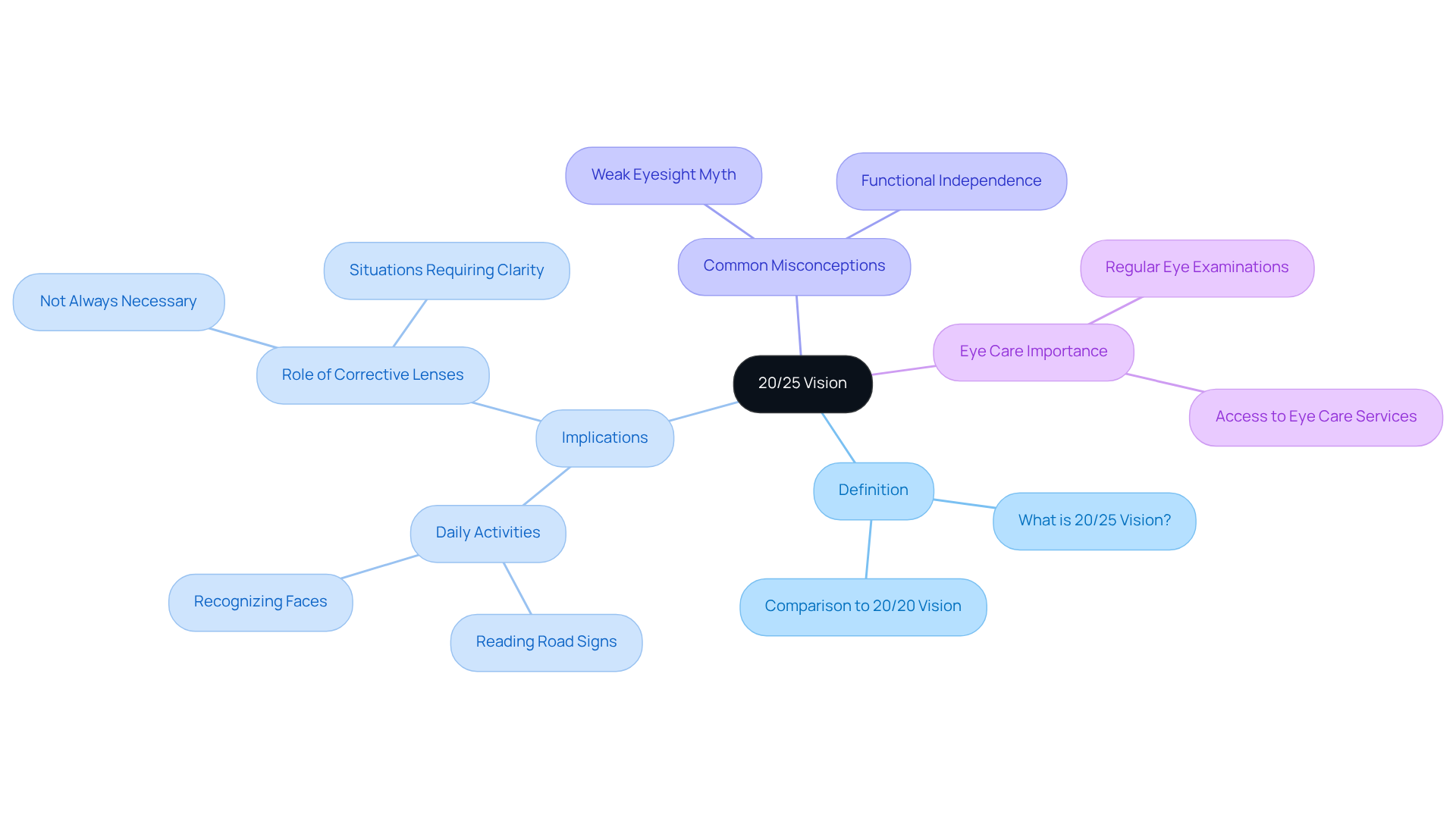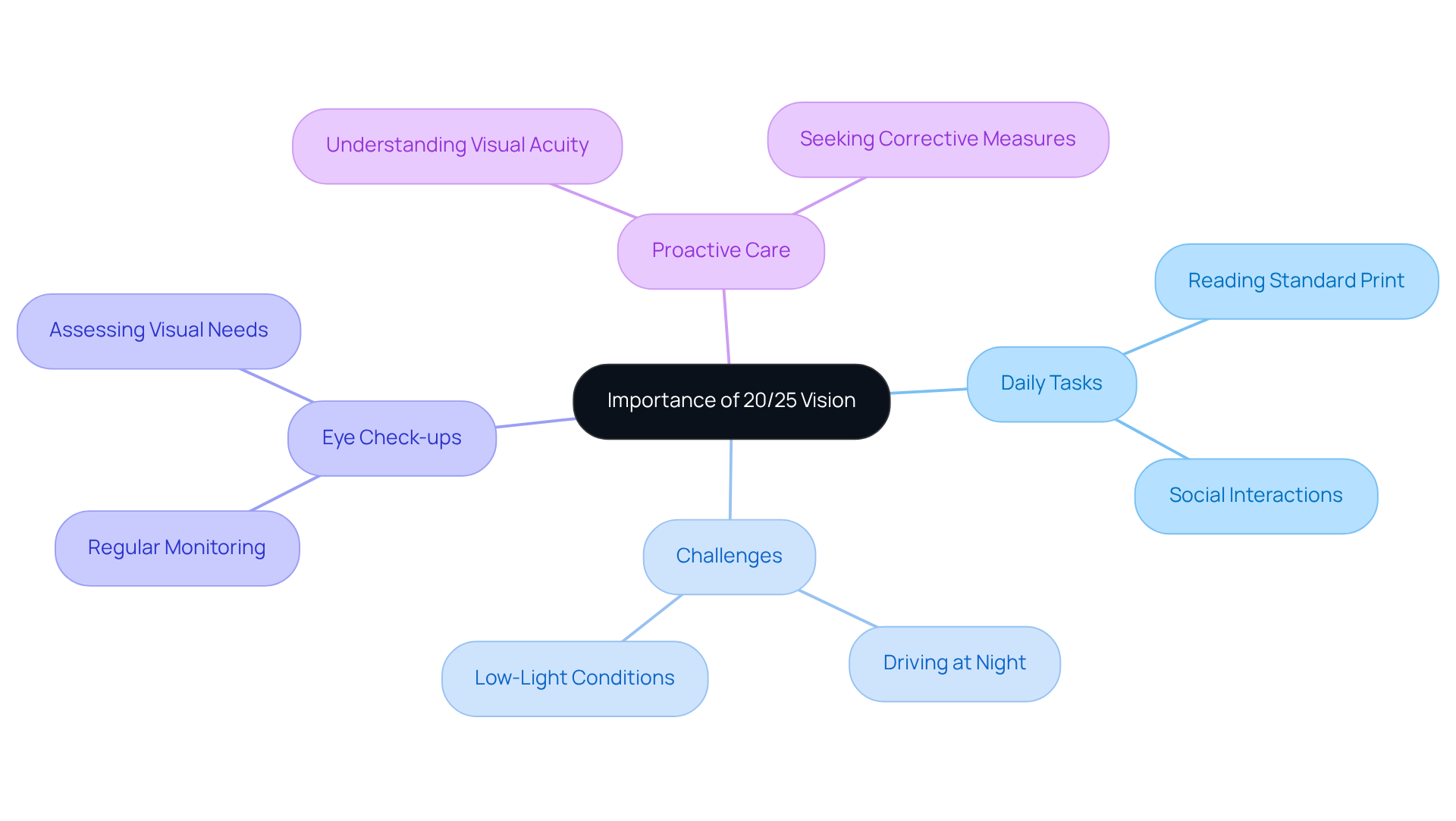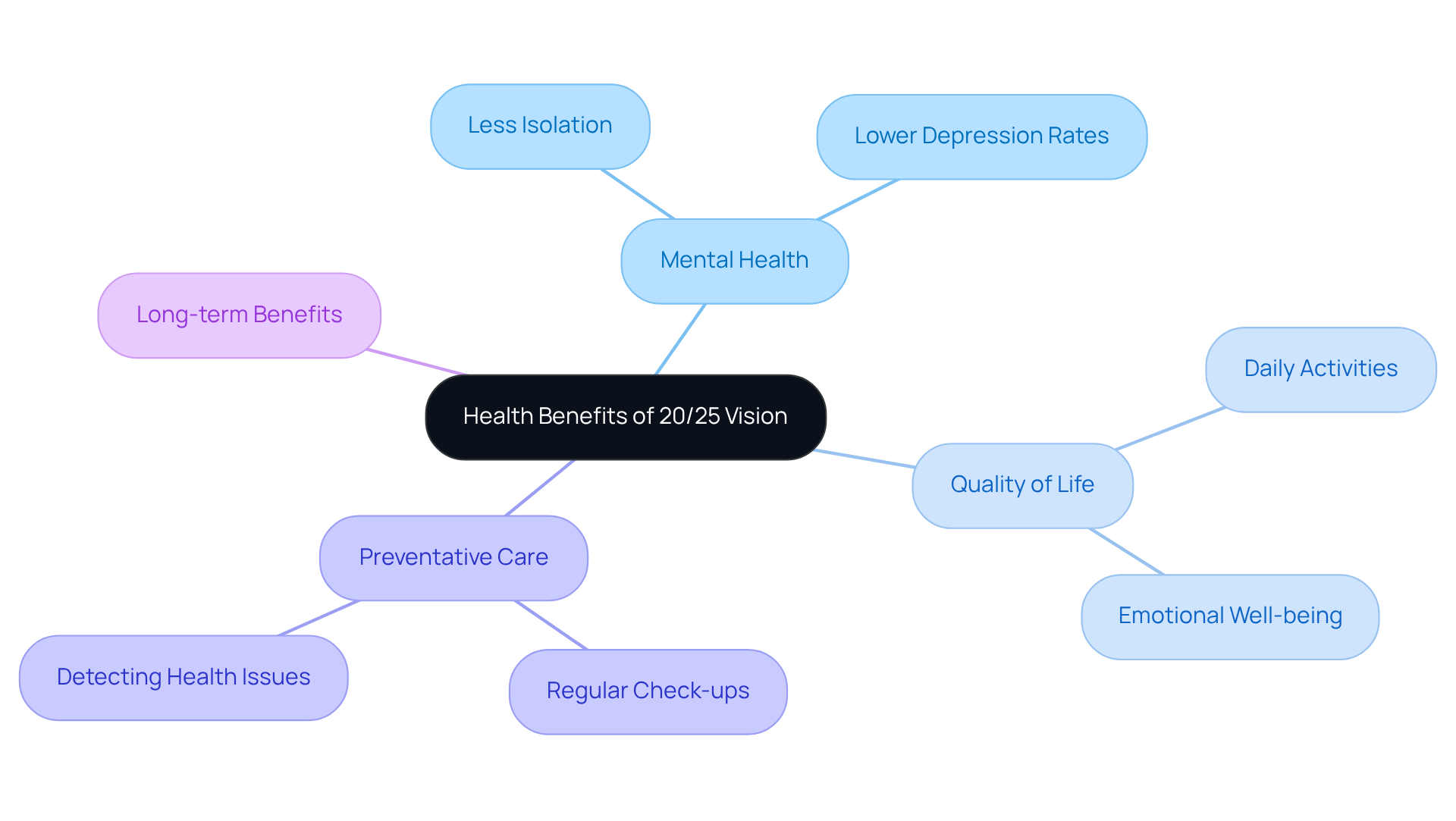Posted by: Northwest Eye in General on November 1, 2025
Overview
20/25 vision is generally considered good. It means that you can see at 20 feet what someone with perfect vision can see at 25 feet. This level of vision allows most individuals to perform daily activities without significant issues.
We understand that you might have concerns about your eyesight. While 20/25 vision indicates a slight decrease in clarity, many people function well with this level of eyesight. It’s common to feel a bit anxious about vision changes, but rest assured, regular eye check-ups are important. They help monitor your visual health and address any specific challenges you may face.
Remember, you’re not alone in this journey. Many individuals with 20/25 vision lead fulfilling lives. We are here to help you through this process and ensure you have the support you need.
Introduction
Understanding visual acuity is essential for maintaining overall eye health. We understand that many people may not be aware of what a measurement like 20/25 vision truly signifies. This level of vision indicates that while clarity may be slightly diminished compared to perfect eyesight, it is still adequate for most daily activities.
However, it’s common to wonder: is 20/25 vision good enough for tasks that demand precision, such as driving or reading fine print? Exploring this topic not only sheds light on the implications of 20/25 vision but also emphasizes the importance of regular eye care.
We are here to help you through this process, and we want to reassure you that there are potential benefits of corrective measures if needed. Regular check-ups can make a significant difference in your eye health and overall well-being.
Define 20/25 Vision: Understanding Visual Acuity Standards
Visual acuity is all about how clearly you can see, and it’s often checked using a Snellen chart. When you see the label 20/25, it raises the question of whether 20/25 vision is good, as it means you can see at 20 feet what someone with perfect vision can see at 25 feet. While this shows a slight decrease in clarity compared to normal sight, many people with this level of vision can go about their daily lives without much trouble. It’s important to know that this isn’t considered poor vision; in fact, it’s quite suitable for most activities. However, some individuals might find that wearing corrective lenses can help them see more clearly in certain situations, like driving at night or reading fine print.
Understanding the implications of having moderate eyesight is crucial, as it often plays a big role in maintaining your independence. Many people don’t realize they have vision challenges until they face situations that require sharp clarity, such as reading road signs or recognizing faces from a distance. There’s a common misconception that having slightly less than perfect vision means you have weak eyesight, but many wonder, is 20/25 vision good, as those with this level of vision usually handle their daily tasks just fine. Regular eye check-ups are vital for evaluating your vision and identifying any potential need for corrective measures, helping you keep your visual health in check as you age.
At Northwest Eye, we truly understand how important it is to access eye care services for your overall eye health. To support our patients, we offer a variety of financing options for eye exams, assessments, and treatments for various eye conditions, including cataracts. Our goal is to make eye health accessible and affordable, ensuring you receive the care you need without any financial burden.

Evaluate the Importance of 20/25 Vision in Daily Life
Many people with slightly less than perfect eyesight can still manage daily tasks quite well. You might find that you can read standard print, recognize faces, and enjoy social interactions without much trouble. However, it’s common to face challenges with certain activities, especially those that require sharp visual precision, like driving at night or reading small text.
A significant number of individuals have good eyesight, highlighting its importance in our lives. While it may not be perfect, this level of vision allows many to maintain a good quality of life. For instance, most states require a minimum of 20/40 eyesight for an unrestricted driver’s license, raising the question of whether 20/25 vision is good for driving.
Regular eye check-ups are essential to monitor any changes in your vision and to determine if corrective lenses could enhance your visual performance in specific situations. Understanding your visual sharpness can empower you to seek timely interventions, ensuring your sight remains as clear as possible. It’s completely normal to feel a bit uneasy about any minor deviations from the norm.
Additionally, you might notice challenges in low-light conditions, which can affect your ability to see distant objects clearly. Taking a proactive approach can significantly enhance your ability to perform tasks that require clear sight, such as driving and reading. Ultimately, this can lead to an improved sense of well-being.
Remember, we are here to help you through this process. Your vision matters, and taking steps to care for it can make a world of difference.

Discuss the Health Benefits of Maintaining 20/25 Vision
Maintaining 20/25 eyesight raises the question of whether 20/25 vision is good for daily activities and overall well-being. We understand that clear eyesight can significantly impact how you feel. Studies show a strong connection between sharp vision and mental health; those with good eyesight often experience less isolation and lower rates of depression, which can be exacerbated by visual limitations.
For instance, research indicates that untreated eye issues can lead to increased anxiety and depression, affecting your quality of life. Consistent eye care is essential, as it can reveal early signs of broader health concerns like diabetes or hypertension, which may first manifest through changes in your vision. Blurred vision can stem from conditions such as nearsightedness, farsightedness, or serious eye diseases like cataracts and diabetic retinopathy. Symptoms like halos and glare can also arise, highlighting the importance of routine check-ups and seeking professional help for any untreated symptoms.
By prioritizing your eye health and considering whether 20/25 vision is good, you can aim for a visual acuity of 20/25 or better, which can reduce the risk of developing more severe eye conditions, such as cataracts or glaucoma, later in life. This proactive approach underscores the need for comprehensive eye care services, including specialized treatments for conditions like astigmatism and dry eyes, available at Northwest Eye.
Ultimately, maintaining good vision is an investment in both your physical and mental health, fostering a more fulfilling and active life. As Northwest Eye emphasizes, “Regular eye examinations can help clarify your individual visual needs and ensure optimal eye health.” We are here to help you through this process.

Conclusion
Understanding the nuances of 20/25 vision is essential for recognizing its significance in daily life and overall eye health. We understand that this level of visual acuity indicates a slight decrease in clarity compared to perfect vision, but it’s important to note that it is far from poor. Many individuals with 20/25 vision can navigate their daily activities effectively. This level of eyesight is generally adequate for most tasks, although some situations may benefit from corrective lenses.
Throughout this discussion, we reveal that maintaining 20/25 vision allows individuals to perform many daily functions, such as reading and socializing, without significant hindrance. Regular eye check-ups play a crucial role in monitoring vision changes and addressing any potential issues before they escalate. Moreover, the connection between clear vision and mental well-being underscores the importance of proactive eye care. Untreated vision problems can lead to broader health concerns, and we want to ensure you’re aware of this.
Ultimately, prioritizing eye health is an investment in both physical and mental well-being. By understanding the implications of 20/25 vision and taking necessary steps to maintain or improve it, you can enhance your quality of life and reduce the risk of developing severe eye conditions. Embracing regular eye examinations and seeking professional guidance ensures that visual health remains a vital part of your overall wellness. Remember, we are here to help you through this process.
Frequently Asked Questions
What does 20/25 vision mean?
20/25 vision means you can see at 20 feet what someone with perfect vision can see at 25 feet, indicating a slight decrease in clarity compared to normal sight.
Is 20/25 vision considered good?
Yes, 20/25 vision is not considered poor vision; it is quite suitable for most daily activities, and many people with this level of vision can manage their lives without much trouble.
Do people with 20/25 vision need corrective lenses?
Some individuals with 20/25 vision may find that wearing corrective lenses helps them see more clearly in specific situations, such as driving at night or reading fine print.
Why is it important to understand the implications of having 20/25 vision?
Understanding the implications of having 20/25 vision is crucial for maintaining independence, as some people may not realize they have vision challenges until they encounter situations that require sharp clarity.
How can regular eye check-ups benefit individuals with 20/25 vision?
Regular eye check-ups are vital for evaluating vision and identifying any potential need for corrective measures, helping to maintain visual health as one ages.
What services does Northwest Eye offer for eye care?
Northwest Eye offers various financing options for eye exams, assessments, and treatments for various eye conditions, including cataracts, to make eye health accessible and affordable.






